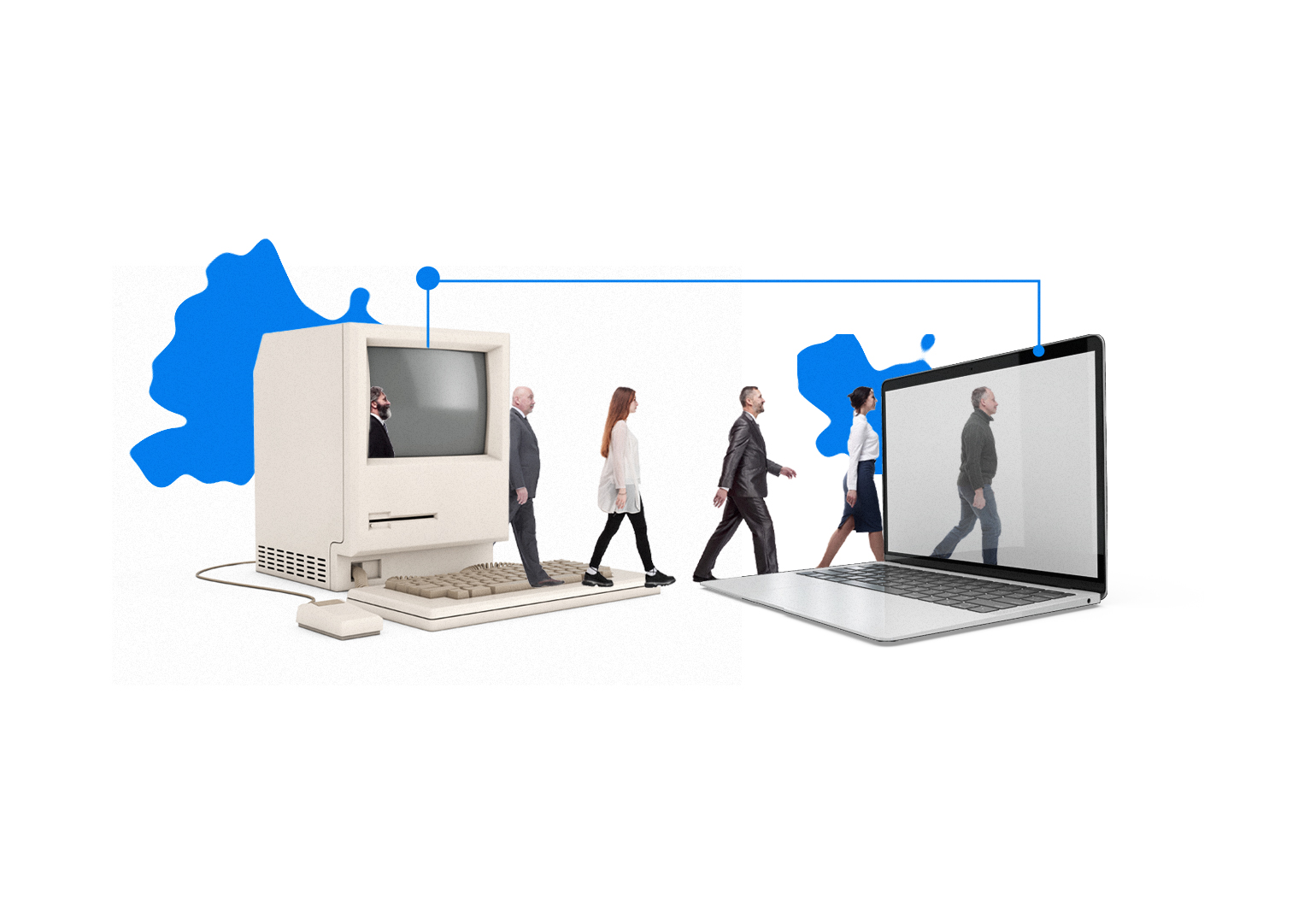When we think about using the Internet, we often ignore the browser itself. Even, to the extent that the internet and browser are often thought of as the same thing. But they’re not. Browser is this incredible application that allows you to browse the internet and it seems to only get stronger with each new tech cycle. Any time an application moves from your dock to a tab, that’s a win for the browser (think Word and Google Docs).
Still, despite the ways our internet use has evolved the browser largely still does what it did twenty-five years ago.
What’s more, we blame ourselves for the browser’s shortcomings. When we have 30 tabs open, we call ourselves inefficient; when we get distracted online, we tell ourselves we need more discipline; when we can’t find a URL, we think we’re disorganized. But we never blame the browser.
Why? Because we think that’s how it’s supposed to be.
That’s soon going to change – inevitably. The browser will soon be the way we use our computers, not just the internet.
Enter stage: the Internet Computer.
Remember the good old days of the computers, where every digital endeavor was a virtual expedition? If you’ve ever screamed at your computer (we’ve all been there), you know what I’m talking about.
For decades, we’ve been performing this awkward dance with our operating systems – bending over backward, jumping through digital hoops, tolerating their bugs and limitations.
All while repeating the mantra, “This is just how computers work.”
Well, what if I told you there’s a new kid in town? – the Internet Computer (IC).
It’s a big thing, really.
Imagine an internet that’s an active participant in your digital journey, rather than a passive observer. A place where all applications live, where your data is yours and yours alone, no more downloads, no more logging in and out, just you and a streamlined, tailor-made internet experience with every site behaving as an application. Where the web browser isn’t just a gateway to the world but the world itself.
Exciting? Absolutely.
Terrifying? A little bit.
Inevitable? You bet.
Let’s call this the Third Brower War. As if we didn’t have enough to worry about with Covid variants, now we have browsers battling it out again.
And the winner won’t just win market share; they will rewrite our whole digital lives.
A New Dawn: The Internet Computer Unleashed
Okay, first a brief refresher course.
An operating system (OS) is this software program that manages all other applications and processes on your device. It oversees resources like memory, processing power, and input/output devices like keyboards, mice, screens, and peripherals.
To a developer, an OS is the platform for which they build.
Think of MacOS, Windows, iOS, and Android – the unseen operators living in the hardware of our computers that hum in the background as we work, play, and navigate the digital world.
But here’s the interesting part: as the internet has infiltrated our lives in every possible way, we’re witnessing an evolutionary leap in OS functionality.
The things that make up our operating systems – applications, files, and utilities – are making their exodus to the cloud.
Today, most of our apps live online, pulling content from the ether of the digital cloud. Our files exist as URLs, as items tucked away in our Google Drives, or as attachments in our emails. They’ve found new homes online.
It’s only a matter of time before the whole OS moves to the cloud and that would be what we’d call the Internet Computer (IC).
With an IC, all of your data, files, and applications exist at URLs. Simply log in to the browser and voila! Everything you need is immediately available, right where you left it. The traditional OS’s role is now merely to run the browser – the only app you’ll ever need to download.
I understand this is all very out there and hard to imagine so let me give you a not so good example.
My Experience with the Proto-Internet Computer
When was the last time you heard someone say: “I’m using Microsoft Edge as my primary browser and loving it”?
Probably, never.
For a very long time, the only thing Microsoft Edge was used for was to download Chrome when first launched your Windows computer.
It’s come a long way since then. I’ve been using it for the past few years
Three reasons:
- Edge is by far the closest any major browser has come to the concept of a proto-Internet Computer. That’s because of its customization options, AI assistant, and integration with the Microsoft ecosystem.
- I believe if any of the tech giants are going to take the Internet Computer seriously, it’s going to be Microsoft.
- And I think it’s cooler than Chrome, okay? Sue me.
So, I use Edge and it looks something like this.

Notice that my Taskbar has just Windows Start button and the Browser and I don’t EVER see my Desktop, the Browser is the only thing I see. My computer is now very flat, it almost has no depth, everything happens on this one surface that is the Browser.
With most of my applications living inside the browser, the clutter on my desktop has vanished. Actually, my whole desktop has vanished. And let’s not even mention the newfound simplicity of having all my utilities and files accessible in one unified digital environment.
As handy as this is right now, it’s still largely desktop-bound and has many challenges. Not an Internet Computer in any way, this is just something I customized for myself but I hope it shows the vision.
Imagine a near future where your mobile device, your tablet, and any other connected gadget allows you to pop open a browser and access the same Internet Computer from any device.
Imagine the ease of having all your apps, files, and utilities neatly organized in one place, irrespective of the device you’re using.
And now, as we stand at the threshold of this new era, we find ourselves facing a conflict – a war not of weapons or nations, but of browsers.
The Browser Wars
In tech, no rivalry has seen more dramatic showdowns than the crazy browser wars.
The first shots were fired in the mid-90s, with Netscape Navigator and Microsoft’s Internet Explorer duking it out for dominance. Internet Explorer emerged victorious, but its triumph was short-lived.
Round two saw the rise of Firefox and Google’s Chrome, with the latter clinching the title of most popular browser – a position it holds to this day. There were victors, there were losers, and oh, there was drama.
But now the third iteration of the browser wars is upon us. And this time, the stakes are higher than ever.
This is not your grandpa’s fight. This war isn’t about the fastest load times or the slickest UI. It’s about who will become the gateway to the Internet AND the Computer in general (Internet Computer, get it now?), and here, conventional browsers might not cut it.
The field has widened, and unconventional players like Arc have joined the fray, promising to fundamentally transform the browser experience but the three main contenders still remain: Microsoft, Google & Apple.
The first contender is obviously Google Chrome (being the most popular browser) but it’s not particularly well positioned for this war. The start with, we shouldn’t forget that Google is a Search, that’s how it makes money and it’s very unlikely to do anything to damage that business model.
For example:
- Better tab management means less searching;
- Sending you straight to the page you want means fewer search results and fewer ad impressions thus smaller revenue;
- Making you close your tabs and reopen them all the time isn’t just acceptable for Chrome; it’s a victory.
Additionally, Chrome’s performance has been declining and its culture struggles with mission focus, urgency, inflated self-perception, and management issues.
Apple
Ugh… I don’t want to spend too much time on this aberration. Apple is a walled garden devices company rapidly expanding out into services. The Internet Computer is a direct threat to its model. The company is savvy, but I don’t think any organization on the face of planet earth could overcome an innovator’s dilemma this strong.
So, Apple is not a competitor in the Internet Computer War.
Microsoft
On the contrary, Microsoft, a company rooted in enterprise software and open platforms, might just be the most likely to fully embrace the IC concept. With an impressive portfolio of future-looking assets, substantial investment in AI, and a willingness to allow open development, Microsoft has the potential to dominate. However, as an enterprise-oriented company, it might struggle with capturing the consumer market on a massive scale.
As much as I hate the Microsoft ecosystem and prefer Google if I personally had to bet I’d put my money on Microsoft.
So, while you’re waiting for the next episode of your favorite binge-watch, keep an eye out for the rumbles in the digital world. This is one showdown you don’t want to miss.
We’re not just spectators, we’re the judges. After all, we’ll choose which digital future fits us best.
To all contenders: you better do a good job! And to us users, may you use the Internet Explorer for the rest of your lives if you don’t choose wisely.
Let the browser wars begin!
Co-founder & Growth Lead at Kernel










